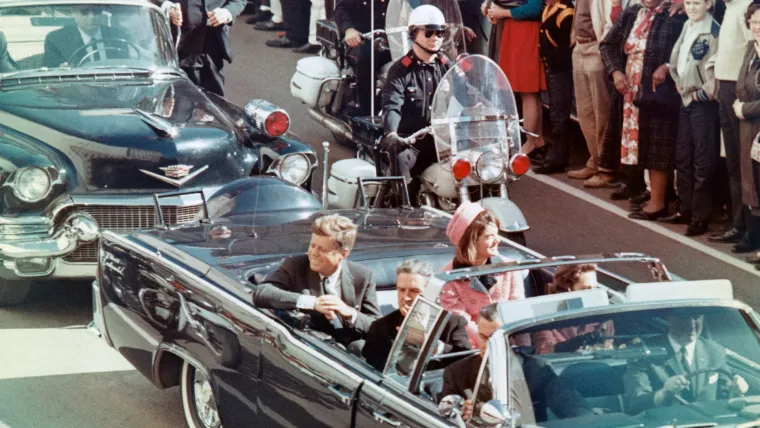Sixty years ago today, Nov. 22, 1963, President John F. Kennedy was assassinated in Dallas. Forty-eight hours later, the NFL played its regularly scheduled games.
It’s hard to describe the shock the nation felt. It’s hard, too, to grasp today the league’s rationale then.
This much is clear: Sadness and confusion, anger and anguish gripped the nation — and, in turn, the National Football League.
Commissioner Pete Rozelle had a decision to make.
Why NFL didn't cancel games after JFK's assassination
With scarcely two days separating the tragedy at 12:30 p.m. CT on a Friday and the start of the league’s Sunday schedule, Rozelle consulted with, among others, JFK’s trusted press secretary Pierre Salinger, who counseled to play the games. But Rozelle also heard from several owners who strongly voiced that the games should be canceled.
With teams awaiting word on whether to travel, Rozelle, 37 at the time, made the call.
On Saturday, Nov. 23, he released a statement: “It has been traditional in sports for athletes to perform in times of great personal tragedy. Football was Mr. Kennedy’s game. He thrived on competition.”
But more than being a fan, Kennedy was a staunch advocate for athletics, The Sporting News noted in an editorial that ran in the issue immediately after the assassination. The headline: “John F. Kennedy … True Friend of Sports”.
TSN ARCHIVES: Honoring JFK, "True Friend of Sports" (Dec. 7, 1963, issue)
In fact, Kennedy was a regular at Senators games when the Red Sox were in Washington, enjoyed attending major league Opening Day in D.C. and frequently attended college football games, especially those of the service academies as well as his beloved alma mater, Harvard.
Still, the backlash to the decision was swift and strong,
In 1994, two years before his death, Rozelle recalled to the New York Times the decision that he faced: “I discussed it with everyone in the (league) office. Late that afternoon, I made the decision. I had to — our teams were calling; they wanted to know what to do.”
In stark contrast, the NFL’s nascent rival, the AFL, chose not to play its games that Sunday. A majority of college games the day before were called off, too, among them the 80th Harvard-Yale football game, a series that had been uninterrupted since it began in 1875.
In his book, “America’s Game: The Epic Story of How Pro Football Captured a Nation,” author and NFL historian Michael MacCambridge makes the point that Rozelle couldn’t have known the role that TV would play that weekend as America grieved.
“The previous cataclysmic events that had been touchstones for most American lives — the attack on Pearl Harbor, FDR’s death or the dropping of the atomic bombs on Hiroshima and Nagasaki — had been experienced through radio reports. … But on that weekend of November 22-24, a nation sat in front of the television, watching itself mourn, and gaining a sense of itself in a way it never had before.”
Ironically, CBS, the NFL’s TV partner at the time, elected not to televise any games that Sunday.
Instead, it, like the other networks that afternoon, broadcast a horse-drawn caisson taking Kennedy's coffin from the White House to the Capitol Rotunda, where he would lie in state.
Some 30 years later, Rozelle, who knew Kennedy personally, admitted his regret and said that playing the games that Sunday was “obviously a mistake.”
“You have to understand, I was more than depressed over the assassination,” Rozelle recalled to the Times. “I had lost someone whom I’d respected as the leader of our country, but I was also a close friend of the Kennedy family.”
Why the Cowboys were a target of anger after JFK’s assassination
Because Kennedy had been assassinated in Dallas, the Cowboys — who played the Browns in Cleveland that Sunday — became a target.
"I was disappointed that it would happen anywhere," Gil Brandt, the longtime Cowboys personnel director, recalled to USA TODAY Sports in 2013. "But my next thought was, 'What a terrible thing to happen in your city.’"
Across several stories, collected by The Washington Post under the headline “America’s (most hated) Team,” players recalled how ugly things were.
- “We were killers, we had killed the president,” Dallas tight end Pettis Norman recalled, according to a 2021 History.com story. “It was amazing. I just could not believe that.”
- Citing a recollection by star Dallas defensive lineman Bob Lilly, MacCambridge wrote that in Cleveland, airport baggage handlers and hotel bell hops refused to handle the Cowboys’ bags.
- On game day, when the team bus pulled up to the stadium on the cold, late-fall morning, Browns fans heckled and cursed them. Once on the field, the Cowboys “looked like zombies,” Lilly said.
- “This city, Dallas, killed our president,” Browns offensive lineman John Wooten told NBC’s Bob Costas in 2013. “That was the feeling that we had. We wanted to get after Dallas.
- ”It’s amazing how [Dallas] took the full blame for President Kennedy’s death,” Norman said.
Yet another twist: Less than an hour before kickoff in Cleveland, alleged assassin Lee Harvey Oswald was shot to death live on national TV.
“There was a tiny television in the visitors’ locker room at Cleveland Stadium,” Cowboys backup QB Eddie LeBaron told the Fort Worth Star-Telegram in 2008. “We had just come back in from [pregame] warmup when we saw Oswald get shot by Jack Ruby.”
At that point, LeBaron recalled, he had advice for his teammates: “Put your helmets on — and keep ’em on.”
Once the game began, the public address announcer, at Browns owner Art Modell's instruction, referred to the visiting team as simply “the Cowboys,” leaving out the city. Modell also ordered extra off-duty police officers as security to protect them.
Final score: Browns 27, Cowboys 17.
“This was a game,” wrote columnist Bud Shrake for the next day's Dallas Morning News, "that nobody was interested in playing, coaching, watching or writing about."

